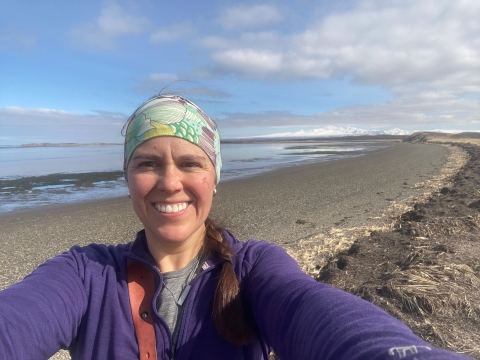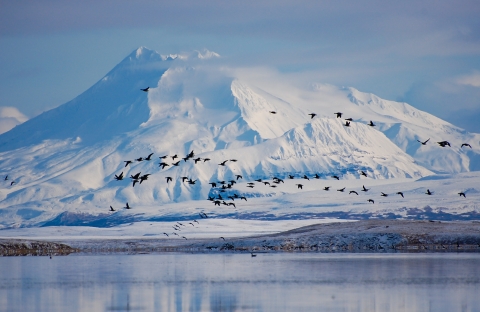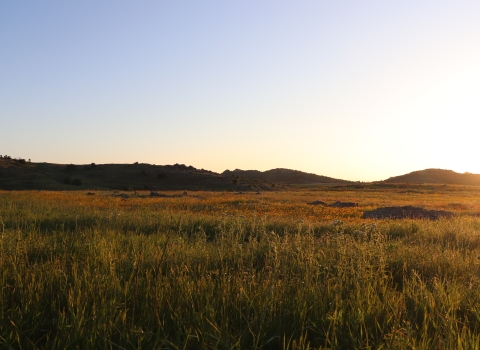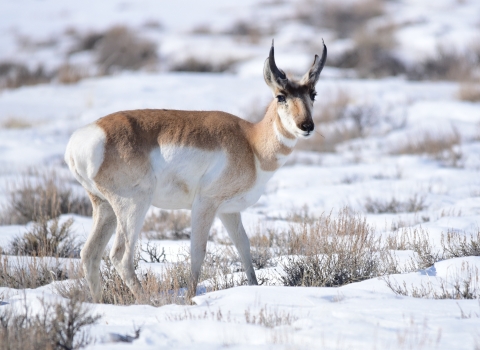In Alaska, the U.S. Fish & Wildlife Service employs a small army of dedicated and passionate staff with a large spectrum of roots. Some were born and raised in Alaska. Others have come from around the world. Regardless, some stay to do a job they feel is important enough to spend a lifetime doing. Like Maria Fosado, who has found herself managing Izembek National Wildlife Refuge.
What do you do for the U.S. Fish and Wildlife Service?
I'm the refuge manager for Izembek National Wildlife Refuge in Cold Bay, Alaska. I'm a transplant from Minnesota and the year I arrived in Cold Bay, it was early June. I left Minnesota in May made my way through Canada and Alaska and arrived on the ferry in June.
Where did you grow up?
I grew up in southeastern Minnesota Red Wing, which is along the Mississippi River and bluff country, essentially.
Have you always liked being outdoors?
I've always been interested in the outdoors, I guess, part of the love for being outside started with my family. I grew up in a hunting family, but then I was also able to participate with an outdoor education program. It's called the Environmental Learning Center in Red Wing. That program actually took kids outside. There was like rock climbing, kayaking, canoeing, winter camping, because I mean, they would take you turkey hunting, duck hunting. It taught you things like how to build a one match fire so that you could stay warm and outdoors if you ended up being stranded. I built snowshoes. So, it was all encompassing, and it encouraged anybody to get outside in any form or fashion that interested them.
What was your first experience with Alaska?
So, I did that all throughout high school, and I actually progressed to what they referred to as the instructor program. And you were like an assistant instructor. So you went on the trips and mentored the next generation of kids coming through. And as a reward, if you will, at the end, we did an instructor trip, and that was actually to Alaska. I was 17-18 and we did a sea kayaking trip. Our group was really motivated, we really wanted to see Alaska, it's this place that most people want to see, but don't get to experience. So, we did a bunch of fundraising, we did the hot dog stands and the bagging the groceries, and somehow we raised enough money, and we actually flew from Minnesota to Washington and then we took the ferry. We did a lot of planning and logistics and some trips to Lake Superior to practice cold water rescues. We packed all our gear for the duration of our trip. So we had the bear barrels and the sea kayaks and we planned out our routes, we incorporated the tides and it's just a fantastic learning experience, because you take responsibility for everything that you're doing, right? If something goes wrong, it's the entire crew that ends up kind of paying for that mistake. It taught you a lot of responsibility, but then also the reward at the end was exponential because you and your group made it from A to Z, and you were successful at it. I've never felt so small sea kayaking in that area. I mean, you're just the tiny person in a kayak and you look around and I had never experienced anything like it.
How did you start your career with U.S. Fish and Wildlife Service?
I was very lucky. I found my first job and actually, my brother forwarded me the link. We were both studying biology. He's a couple years older, he was looking for jobs. He saw a link for a job at Rice Lake National Wildlife Refuge outside of McGregor, Minnesota, and it was for a park ranger, actually. And I applied and I got an interview and I was selected for the position. I worked for a fantastic refuge manager there who gave me a lot of different opportunities. Like I said, it was a park ranger position and they had actually hired two additional bio techs, and as the opportunities presented themselves, she would allow me to go out with them in the field. I also manned the visitors service station for a big birding area. So I ran the visitor center on the weekends. And it just gave me a little bit of diversity. And it made me realize that it was something that I could continue to explore various options within the Fish and Wildlife Service and to really hone in on the area that I wanted to end up with or in I guess I should say. So while I knew I had enjoyed my job, I knew that my visitor services job was great, but that the biotech jobs that the other two had were even better. And the next summer that's what I did. And I actually ended up working for the same manager just at a different station. I just knew that the days went by much quicker when I was outside. So it didn't matter if I was helping somebody do a bird survey or if I was doing a forest inventory in the Nelson-Trevino bottoms along the Mississippi River. The hands-on aspect of getting on a boat, going to the worksite, spending all day in the woods, and then coming home at the end of the day. That's really what I enjoyed. It really, at that point in time didn't matter what I was doing outside so long as I was outside.
How did you end up at Izembek National Wildlife Refuge?
Yeah, I'm definitely, a middle-of-nowhere person. I don't know, I guess probably for me, I've always been outdoors and getting outside has been kind of an escape and where I feel happiest and most comfortable. You know, I love the winters, I love snow. I love getting out with my dog. Just getting away from people and getting away from the hustle and bustle of everything else that's going on has always just been where I can reset. I don't reset when I'm surrounded by people I reset when I'm in nature and when I can take time to either watch the stars, or watch the snowflakes fall, or birds coming in overhead and landing on a lake, or a pond, or a wetland. To me, that's the comfort zone, you put me out of my comfort zone when I'm surrounded by people and when I'm in very populated areas, if you will. I was selected for the assistant manager position at Big Stone National Wildlife Refuge and that was the stepping stone. I still- since it was a small staff was able to do a lot of the field work but it blended more with the supervisory, and the management, and the mentoring, and the leadership position. I was able to get a little taste of that. And I decided that there were so many people that had helped me along the way there were so many supervisors that, you know, saw potential, developed, gave me the opportunities. So at that point in time, it's like okay, well a lot of people have given to me, it's time for me to give back. And the position at Cold Bay was advertised, and I applied, and here I am.
How is it working at Izembek National Wildlife Refuge?
Izembek is unlike anything that I've experienced. It's a completely intact landscape. It is a functioning ecosystem. In comparison to- I come from Minnesota. It's a heavily agricultural area, there's a lot of farming, there's a lot of- the prairie has been converted, the wetlands have been drained. So there's a lot of human presence, if you will. When you arrive at Izembek, there's a little bit of that. There's, you know, a few roads, there's a few trails, but really, overall, it's a pristine ecosystem, where if you want to be the only one out all you have to do is go park your truck on the side of the road and hike 30 minutes and you can experience the feeling of being in a place all by yourself. Just with nature. You can you know, hear the wildlife. You can hear the birds, you can eat berries along the way. You have salmon, you have bear, you have caribou, you have shorebirds, you have waterfowl migrating through. I mean, it's just- to me, everything's connected. So without one, you know, what do you have? Or what are the impacts if you lose one? Anyone that loves the outdoors, loves wildlife, in any capacity, would be able to find, I think, joy out here.
Why do you do the work you do?
The experiences that I had growing up, I would hope would be available to the next generations to come. And I feel as though one way to ensure that is to work in natural resources and try and do our best to protect and conserve it for the generations to come. And that's really why I do what I do. I mean I'm obviously very passionate about the outdoors. So I really do it because I've enjoyed it and I want others to enjoy it. I don't have children, but I have nieces and nephews and the smiles they get when they go fishing, pull a little fish out of a lake. I want others to have that opportunity. I think in Alaska we're very fortunate because there's a lot of public land. But in other states it's a little bit different scenario. And so, the ability for all of Americans to be able to step outdoors and find a place where they can connect with nature, I think that is very important.
Adapted from episode 5 of the My Life, Wildlife Podcast!
In Alaska, the employees of the US Fish and Wildlife Service are shared stewards of world renowned natural resources, and our nation's last true wild places. The lands and waters of this place we call home, nourish a vast and unique array of fish, wildlife and people. Our hope is that each generation has the opportunity to live with live from discover And enjoy the wildness of this odd inspiring land and the people who love and depend on it.
Follow us: Facebook Twitter Medium
Subscribe to My Life, Wildlife! On Apple or wherever you get your podcasts







